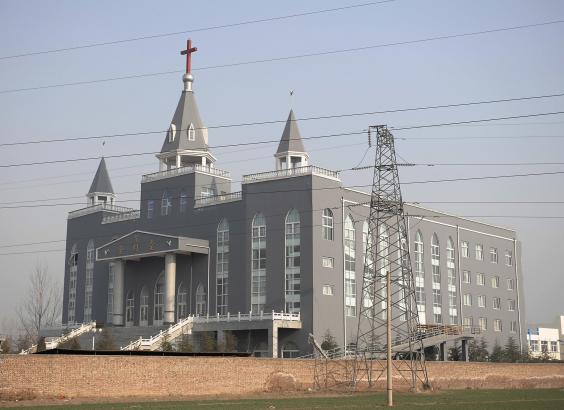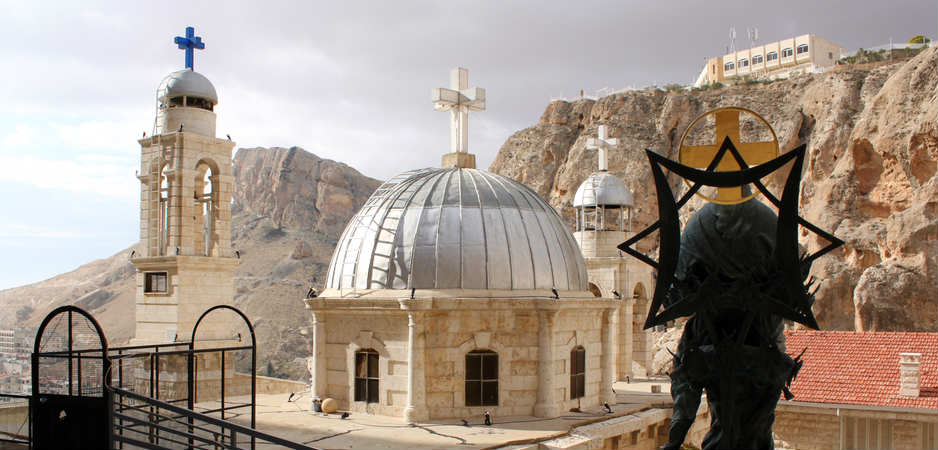Christians Under Siege From the Middle East to China
"[The authorities] have been plotting to bomb the church ever since 2009."
"They were hesitant at the time after hearing rumours that officials from the United Nations visited the church and took photos. But now they've actually done it."
Parishioner, the Golden Lampstand Church, Linfen, China

"The repeated persecution of the Golden Lampstand Church demonstrates that the Chinese government has no respect for religious freedom or human rights."
Bob Fu, founder, president, China Aid, Midland, Texas
 |
| The Golden Lampstand Church in Linfen, Shanxi province. Pictured in 2009 AP |
Tens of thousands of Chinese Christians raised 17 million yuan ($3.3-million) in Linfen, a city of 4.3-million Chinese, to build their church in 2009, which was, in fact, an 'unauthorized' place of worship. That same year, squads of security police descended on the church, smashing the building, seizing bibles. But the parishioners picked up the pieces and continued to attend their church for services. Until January 7 when the unauthorized "house church" was entirely destroyed by the People's Armed Police, a paramilitary answering to the regime.
This followed persecution and imprisonment of many of the church leaders, according to reports by ChinaAid, the U.S.-based NGO. Explosives were detonated, completely destroying the church this time around, as people stood by witnessing the demolition, weeping at the sight of the destruction being carried out. Not that state-sanctioned Christian Churches are totally free of persecution by the regime. Christmas celebrations planned by Chinese Christians in 2017 were suppressed or curtailed, people attending subject to surveillance camera monitoring, installed by the authorities.
 |
| AFP PHOTO / ANWAR AMRO |
A century ago they comprised twenty percent of the region's population. Within the last fifteen years their numbers have been reduced to 3 percent of the population. They fled Mosul in 2014 when Islamic State entered to take control from the suddenly-vanished Iraqi military. A half-million of Mosul's civilian population hurriedly exited the city; 200,000 Christians and 200,000 Yazidis, fleeing for their lives, knowing full well that ISIL would be targeting them.
As internally displaced people they thronged United Nations refugee camps for haven, taking their place alongside the mostly Shiite Muslims who had left Mosul to the Sunnis who would fare slightly better under Islamic State rule; a sectarian match. In those refugee camps the Christians found they continued to be targets of persecution, their religion viewed as anathema to the Muslims who shared the misery of the camps.
From Sweden where his family fled when Turkish-Cypriot conflict reached out to make his family vulnerable to violence in Midyat, Turkey in the 1970s, Assyrian Christian Nuri Ceyhan Kino, a journalist and filmmaker by profession, responded. He had foreseen this latest catastrophe that Assyrian Christians would be exposed to, had written about its imminence, produced documentary films that failed to take the attention of, much less influence people in power, leaving the region's Christians vulnerable to the malevolence aimed at them from the region's majority Muslims.
He undertook a mobilization of volunteers in 2014 to join in launching a social media campaign to alert the international community to the tragedy about to unfold and to coordinate protests around the world.A documentary was produced titled "Our Last Stand" portraying the plight of Assyrians in Iraq and Syria. And then a new NGO was established in Sweden, calling themselves A Demand for Action (ADFA) with representatives in cities hosting Middle Eastern Christian populations, among them Washington, Toronto, Melbourne and Berlin with a mandate to protect all Assyrians/Chaldeans/Syriacs, along with other Middle Eastern minorities.
AFDA is active in projects supporting all minorities from the Middle East, funded by Middle Eastern Christians of all denominations around the world, and staffed entirely by volunteers. And here is where the irony kicks in. In Sweden, in Australia, in Germany and elsewhere where Christians from the Middle East have sought haven and found sympathy, Muslims too have converged in even greater numbers, as refugees and haven seekers, opportunists and economic migrants fleeing turmoil in their countries of birth and bringing with them the same prejudices and hatreds that resulted in the tragic persecution that the Christians have fled.
 |
| Shutterstock |
Labels: China, Christians, Iraq, Middle East, Persecution, Syria
0 Comments:
Post a Comment
<< Home